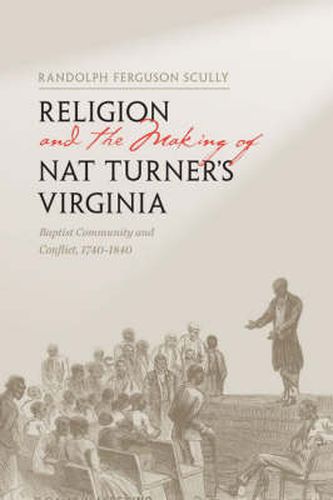Readings Newsletter
Become a Readings Member to make your shopping experience even easier.
Sign in or sign up for free!
You’re not far away from qualifying for FREE standard shipping within Australia
You’ve qualified for FREE standard shipping within Australia
The cart is loading…






Religion and the Making of Nat Turner’s Virginia provides a new interpretation of the rise of evangelical Christianity in the early American South by reconstructing the complex, biracial history of the Baptist movement in southeastern Virginia. This region and its religious history became a subject of intense national scrutiny in the wake of the 1831 revolt led by the enslaved preacher and prophet Nat Turner. But by the time Turner led his fellow slaves on their deadly march across the fields and swamps of Southampton County, Virginia’s religious landscape had already been shaped by more than eighty years of conflict about the implications of evangelical faith for the evolving cluster of interrelated ideas about race, slavery, household, family, and patriarchy that constituted the state’s social order.For both black and white Virginians, evangelical discourses of authority, community, and meaning provided the material for a wide variety of interpretations of Christianity’s social and spiritual message during the Revolutionary and early national eras. Even as some white church leaders sought to institutionalize a white, paternalist vision of evangelicalism’s meanings, rapidly increasing black participation in Baptist congregations in the early nineteenth century provided fertile ground for new, alternative interpretations of Baptist concepts and practices.The Turner rebellion brought these diverse subterranean currents of dissent to the surface in ways that upset the delicate balance between white institutional authority and black spiritual independence that had evolved in the previous decades. Reaction to the uprising intensified the trend toward separation and segregation of black and white religion in the antebellum period and had powerful, lasting effects on race relations and religious culture in America.
$9.00 standard shipping within Australia
FREE standard shipping within Australia for orders over $100.00
Express & International shipping calculated at checkout
Religion and the Making of Nat Turner’s Virginia provides a new interpretation of the rise of evangelical Christianity in the early American South by reconstructing the complex, biracial history of the Baptist movement in southeastern Virginia. This region and its religious history became a subject of intense national scrutiny in the wake of the 1831 revolt led by the enslaved preacher and prophet Nat Turner. But by the time Turner led his fellow slaves on their deadly march across the fields and swamps of Southampton County, Virginia’s religious landscape had already been shaped by more than eighty years of conflict about the implications of evangelical faith for the evolving cluster of interrelated ideas about race, slavery, household, family, and patriarchy that constituted the state’s social order.For both black and white Virginians, evangelical discourses of authority, community, and meaning provided the material for a wide variety of interpretations of Christianity’s social and spiritual message during the Revolutionary and early national eras. Even as some white church leaders sought to institutionalize a white, paternalist vision of evangelicalism’s meanings, rapidly increasing black participation in Baptist congregations in the early nineteenth century provided fertile ground for new, alternative interpretations of Baptist concepts and practices.The Turner rebellion brought these diverse subterranean currents of dissent to the surface in ways that upset the delicate balance between white institutional authority and black spiritual independence that had evolved in the previous decades. Reaction to the uprising intensified the trend toward separation and segregation of black and white religion in the antebellum period and had powerful, lasting effects on race relations and religious culture in America.